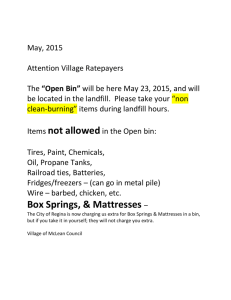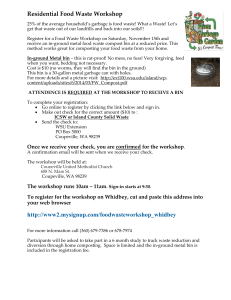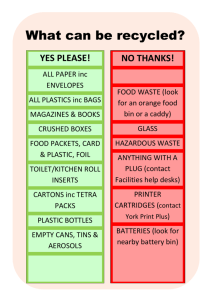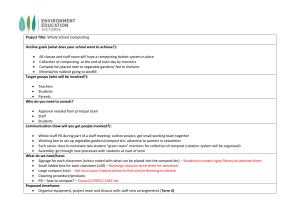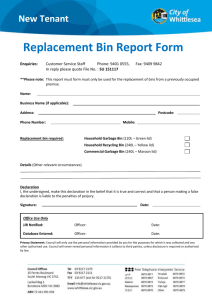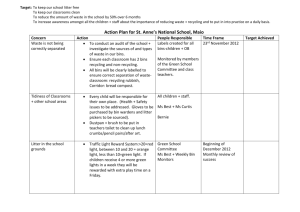Information about the City-to-Soil project
advertisement
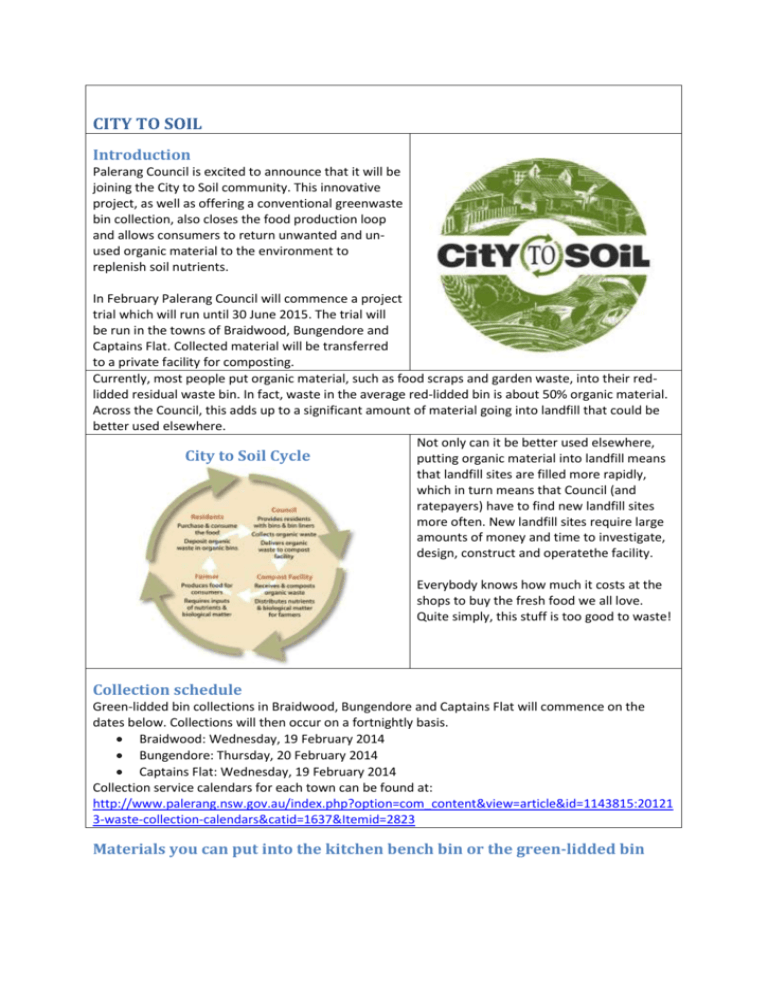
CITY TO SOIL Introduction Palerang Council is excited to announce that it will be joining the City to Soil community. This innovative project, as well as offering a conventional greenwaste bin collection, also closes the food production loop and allows consumers to return unwanted and unused organic material to the environment to replenish soil nutrients. In February Palerang Council will commence a project trial which will run until 30 June 2015. The trial will be run in the towns of Braidwood, Bungendore and Captains Flat. Collected material will be transferred to a private facility for composting. Currently, most people put organic material, such as food scraps and garden waste, into their redlidded residual waste bin. In fact, waste in the average red-lidded bin is about 50% organic material. Across the Council, this adds up to a significant amount of material going into landfill that could be better used elsewhere. Not only can it be better used elsewhere, City to Soil Cycle putting organic material into landfill means that landfill sites are filled more rapidly, which in turn means that Council (and ratepayers) have to find new landfill sites more often. New landfill sites require large amounts of money and time to investigate, design, construct and operatethe facility. Everybody knows how much it costs at the shops to buy the fresh food we all love. Quite simply, this stuff is too good to waste! Collection schedule Green-lidded bin collections in Braidwood, Bungendore and Captains Flat will commence on the dates below. Collections will then occur on a fortnightly basis. Braidwood: Wednesday, 19 February 2014 Bungendore: Thursday, 20 February 2014 Captains Flat: Wednesday, 19 February 2014 Collection service calendars for each town can be found at: http://www.palerang.nsw.gov.au/index.php?option=com_content&view=article&id=1143815:20121 3-waste-collection-calendars&catid=1637&Itemid=2823 Materials you can put into the kitchen bench bin or the green-lidded bin FAQ Are there any other Council’s running the City to Soil program? Yes. City to Soil has been running in Goulburn for a number of years, as well as in HardenMurrumburrah and Condoblin. Armidale also run the program and have been highly successful. All collection services are organised and managed by the local Council in these areas. What if I compost at home already? Excellent. Keep up the good work! If you are already composting, then you are already helping to reduce waste and improve the environment. But when composting at home is there anything organic you don’t put in your compost? Many people don’t put meat scraps or seafood into their compost as they are concerned that will attract vermin or cause bad smells. These scraps are still compostable though, so toss them into the kitchen bench bin for collection and composting off-site. Why do we need to use the liners? Well, if you’ve seen the kitchen bench bin you can probably see part of the reason for using the liners. The second part of the reason (and the most important part) is that the liner allows the kitchen scraps to dehydrate, thus reducing the weight of the material for transport. Dehydrating the scraps also prevents smells and soggy messes. Can I use any plastic bags in the kitchen bench bin? No. It is critically important that you use only the bin liners provided to you. The bags are specially designed and constructed out of corn starch. The corn starch bags break down quickly in a compost heap, and don’t cause problems later in the process. Using other plastic bags, even those labelled “bio-degradable” will require additional work to produce the compost, as they do not break down quickly. Additional bags are available from Council free of charge. Where can I get additional kitchen bench bin liners? You should have enough kitchen bench bin liners to last approximately 6 months. Once you’ve used them up, additional bin liners are available from the Bungendore or Braidwood Council office free of charge. When do the collections start and when are the collections? Collections will commence in the week starting Monday 17 February 2014. In Braidwood and Captains Flat, collections will occur fortnightly on Wednesday commencing 19 February 2014. In Bungendore, collections will occur fortnightly on Thursday commencing 20 February 2014. Please refer to your waste calendars for future collection dates. Where is the trial being run? The City to Soil trial is being run in the Braidwood, Bungendore and Captains Flat village areas. Maps of the areas are available using the links below. Won’t the kitchen bench top bins smell? No. The provided bin liners will allow the waste material to dehydrate. The special design of the bin also increases air flow around the waste, which increases the amount of dehydration. By drying out the waste, and keeping the waste aerobic, the waste doesn’t break down quickly and release smells. What can I put in the bin? You can put pretty much anything that once grew into the bench-top bin and/or the green waste bin. On the underside of your 240L bin there is a sticker that lets you know what you can put in, and information is also on the leaflet that came with your bench-top bin. Any branches you place in the bin should be no more than 25mm in diameter. Branches larger than this diameter can be taken to Council’s landfills for disposal. Why is it only limited to Bungendore, Braidwood and Captains Flat? As this is currently only a trial, not all areas of the local government area are receiving the service at this stage. If the trial is successful the service will be considered for all areas that receive a residual waste bin (a red-lidded bin) service. Where does the collected material go? Once collected, our waste trucks transport the material to a privately run composting facility within the Palerang Council area. Why are we doing this? There are three main reasons that Council is undertaking this project. Firstly, waste diverted from landfill is a win for the environment. Food waste and other organics have large amounts of nutrients and by putting them through a composting process the nutrients are able to be taken up by growing plants. This can potentially increase growth rates and yields, which means that growers can use less fertilisers and other growth promotants. Secondly, Council (and by extension ratepayers) will gain a future financial benefit. The adopted Waste Management Strategy for Palerang Council involves the closure of all landfills within the Council area. Once complete, all waste will need to be transported to a privately run landfill in either the ACT or nearby areas of NSW. At these facilities we will be charged a fee for disposal based on the weight of the waste material. The less we send to landfill, the less we will pay and the less ratepayers have to pay. Lastly, the project has the potential to generate new employment and revenue streams within the Council area. How do I use the service? Using the service is very simple. Simply place organic waste from the kitchen into the kitchen benchtop caddy. Once full, remove the liner and tie the bag up. Please don’t use any form of clip to tie the bag as it will contaminate the compost when finished. Take the tied bag and place it in the greenlidded bin. Organic waste from outside the kitchen can be placed directly into the green-lidded bin. On collection day, or the night before, place your bin on the street near your red-lidded bin for collection (except for those in Captains Flat, who have different collection days for their red and green lidded bins). To help our drivers out, please make sure both bins are accessible and try to leave about a 0.5 metre gap between the bins. How does the composting process work? Once delivered to the site, the green waste will be arranged into long rows and sprayed with an organic mixture called an inoculant – a liquid with a high proportion of bacteria to assist biological breakdown. The rows are then left for around 6 weeks before being screened and contaminants removed. The compost is again arranged in rows, inoculated and left to breakdown for a further 6 weeks. When finished the compost is again checked for contaminants and any large organic matter that didn’t breakdown properly is removed. The finished compost is then tested to ensure it complies with relevant health and regulatory requirements. After being passed as fit for use, the compost is then applied to farm paddocks to assist vegetation growth.
